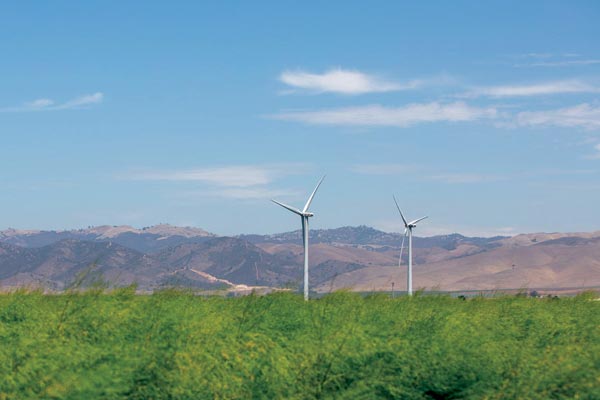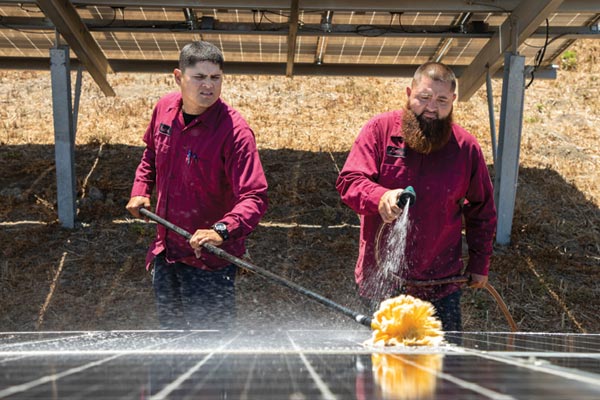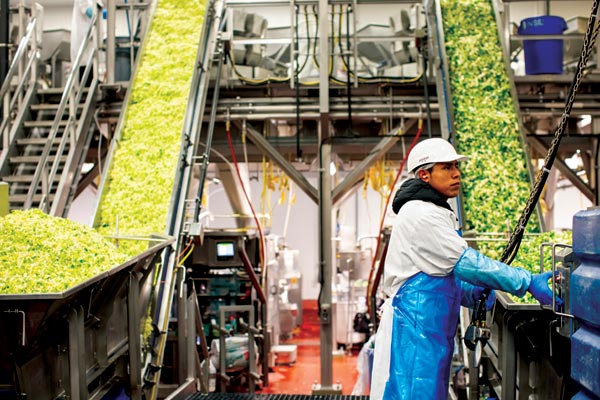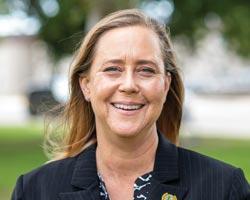A Clear, Green, Vision for Economic Growth

The first thing that catches your eye in Gonzales are the twin wind turbines that stand like sentinels at the edge of an agricultural industrial park on the city’s northern border.
Around town, solar panels power the community pool, police headquarters, a wastewater treatment plant, and water wells.
Thirty miles east of Monterey Bay, Gonzales harnesses the wind and sun to reduce its carbon footprint and demonstrates how a community can use its stewardship of the environment as a way of encouraging economic vitality. City partners are combining efforts to preserve the environment with the need to generate more well-paying jobs to build a stronger Culture of Health in Gonzales.

Gonzales was the first city in Monterey County with a certified climate action plan—a state requirement—and has already met its 2020 target for reducing energy use and greenhouse gas emissions.
“We’re leveraging what we do well to attract economic development,” says City Manager René Mendez.
Work on the environment and economy falls under the direction of the Gonzales Grows Green (G3) initiative, which started a decade ago as a way for the city to interact with businesses on basic needs like recycling. The initiative has since grown into valuable connections and relationships that extend well beyond the run-of-the-mill city business of issuing permits and licenses, says Maury Treleven, G3’s project manager. “That really sent us on a path to creating long-standing relationships,” she says. “We’ve been able to provide opportunities for our businesses because we know more about them and how they operate.”

One of these relationships came into play five years ago when a major employer—the Taylor Farms vegetable-processing plant that bags salad for national supermarket chains—wanted to expand. The project included supplying energy from a wind turbine but faced a potential roadblock: the flight of the condors. This nearly extinct bird had been reintroduced to the mountains along the Salinas Valley, and the question was whether a towering turbine would be a threat to them.

City officials proactively asked a nonprofit wilderness society dedicated to protecting the condor to provide an answer first. After investigating, the Ventana Wilderness Society advised that the condor’s habitat did not extend to the floor of the Salinas Valley, thus giving the project the momentum to proceed to the next stage of the regulatory process.
“We brought people to the table,” Mendez says. The city owns the land under the turbines, while a nonprofit developer, Foundation Windpower, built and financed the project, and Taylor Farms committed to using its power. Another food processor, Mann Packing/DelMonte Fresh, will use energy from a second wind turbine when it opens a new plant, creating 525 jobs.
The commitment to economic vitality extends to Gonzales’ homegrown small business owners. The city used a federal community development block grant of $400,000 to finance a revolving low-interest loan program for small businesses, which has made 10 loans worth more than $1 million since its start in 2010. Luz Garcia, a physician assistant, received a $100,000 loan to open an ultrasound clinic. Before the Gonzales Medical Imaging Center opened its doors in a space inside the Gonzales Pharmacy in the heart of town, a patient would have to find transportation to get to Salinas, 17 miles to the north, for an ultrasound. “These services were much needed,” Garcia says.

Mendez says the loan program, like the G3 initiative, strengthens connections and helps to create jobs. In the past 15 years, the city has added 1,500 jobs and, in recent years, seen its tax base expand at an annual rate of 9 percent. The pipeline to well-paying jobs will flow back into the community as a health benefit, Mendez says. If someone is earning enough to maintain a satisfactory quality of life, he adds, “you feel better, you treat people better.”
(Text and video used courtesy of the Robert Wood Johnson Foundation, copyright 2019; Photos used courtesy of the Robert Wood Johnson Foundation, copyright 2019 Josh Kohanek.)


